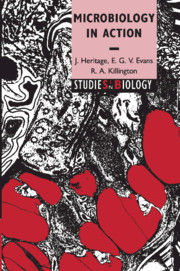Book contents
- Frontmatter
- Contents
- Preface
- 1 The microbiology of soil and of nutrient cycling
- 2 Plant–microbe interactions
- 3 The microbiology of drinking water
- 4 Microbial products
- 5 Food microbiology
- 6 The human commensal flora
- 7 Microbial infections
- 8 Chemotherapy and antibiotic resistance
- Further reading
- Glossary
- Index
6 - The human commensal flora
Published online by Cambridge University Press: 05 June 2012
- Frontmatter
- Contents
- Preface
- 1 The microbiology of soil and of nutrient cycling
- 2 Plant–microbe interactions
- 3 The microbiology of drinking water
- 4 Microbial products
- 5 Food microbiology
- 6 The human commensal flora
- 7 Microbial infections
- 8 Chemotherapy and antibiotic resistance
- Further reading
- Glossary
- Index
Summary
What constitutes the resident and transient flora of humans?
It has been estimated that the human body contains cells. Of these, 90% are not of human origin. They represent the microbes of our commensal flora. The term commensal is partly derived from the Latin word mensa, meaning table. Commensal organisms are considered to share their food from a common table; one that we provide as human hosts. Different anatomical sites are associated with a flora peculiar to each location.
During our time in the womb we live in a sterile environment, protected on one side by the placenta and on the other by the amniotic sac. From the moment of birth, however, we are subjected to a huge array of microbes. The first organisms that we as babies come across are those present in the birth canal. During birth we inhale, swallow and acquire on our surface a vast diversity of microbes as a result of contact with the new environment. This process will continue throughout our lifetime. If the organisms with which we come into contact find themselves in a suitable ecological niche, whether on an internal or an external surface, they will multiply and form complex communities. They will interact with each other and with their human host. This process requires the microbes to adhere to the host as an initial step in the colonisation process and then the microbes must multiply.
- Type
- Chapter
- Information
- Microbiology in Action , pp. 119 - 129Publisher: Cambridge University PressPrint publication year: 1999

